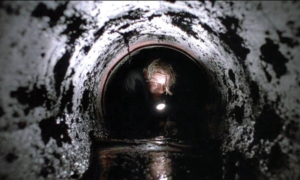In this week’s Gospel sermon article here on the CEP website I noted the dramatic experience of Peter in Mark 8 when he falls about as far as a person can fall within the span of minutes. Peter goes from being blessed to the heavens by Jesus to being cursed to the depths of hell by Jesus who even calls Peter “Satan.” Peter still holds the world record for fastest change in status.
If you read the entirety of Psalm 22, you may have a similarly disorienting experience. The psalm goes from the early verses of dereliction, abandonment, and torture (“My God, my God, why have you forsaken me?”) to the closing verses that rhapsodize over how great God is and how all peoples (living and dead) will eventually give God the glory. What’s more, despite the opening claim of divine abandonment, verse 24 claims that that appears to have been a mistaken sentiment. God had not abandoned anyone after all. The earlier cry for help was received and responded to. God had never gone anywhere as it turns out.
Most Psalms of Lament eventually turn a corner (exceptions are Psalms 39 and 88). The psalmist vows to praise God again in the future when deliverance from affliction comes. Or the psalm (like Psalm 22 perhaps) is written in retrospect after deliverance came and so praise is given for that. Or (think of Psalms 42-43) the psalmist remembers past times when God came through for him and this in turns provides a ray of hope that this will happen again sometime (hopefully) soon.
Often, though, this turn back toward more hope-filled things is brief. A quintessential Psalm of Lament is Psalm 13 and its vow to praise God and put hope in God comprises just a verse or so. Yet Psalm 22—a poem that begins with the most searing lament of them all—goes on and on and on for a very long time at the end with these more sunny things, thus shifting the psalm’s tone. Fully one-third of the whole song is about praise and hope and restored joy.
Sometimes this leads commentators or preachers to use the ending of the psalm as a reason to wash out or nuance into insignificance the bracing opening verses. I once heard an Old Testament professor claim that since even Jesus knew how Psalm 22 ends, his quoting the first verse from the cross means we cannot take Jesus seriously. Jesus did not really feel abandoned by his Father and the Spirit. He knew his situation was not that bad because he knew how Psalm 22 concludes. So one has to imagine that when Jesus cried out “My God, my God, why have you forsaken me!?” he did so with a bit of a wink and a nod, a twinkle in his eye since what he was actually signaling was that he was not abandoned at all because the end of Psalm 22 takes all the air out of that idea.
But my friend Frederick Dale Bruner doubts that premise. A lot. As Dale has said, “When you are hanging on a cross, you are not at the same time holding a Bible study.”
Does the lyric ending of Psalm 22 undercut its searing opening? Is everything contained in verses 22-31 a way to write off the beginning of the psalm as essentially mistaken impressions and bad theology? Or can we hold these in tension? Can we say that the sense of abandonment in the early verses was utterly real to the psalmist—and in the moment at least that this was the poet’s truest experience that had some solid evidence to support it as well—even though the day comes when God roars back on the scene to make things better?
Yes, we can and should hold these things in tension. Because if we don’t, we make the laments in the Hebrew Psalter out to be either brazen lies, stagecraft, or giant mistakes of perception. And if we take that line of thought, then it is a short hop, skip, and a jump to telling people something they are told too often as it is: “Never talk to God this way because you are always wrong when you say these impolite things to God and God must surely despise such prayers. Don’t do it. Don’t lament. Suck it up when bad things happen and know that those bad events are not nearly as real or important as God’s abiding presence, which your faith is apparently too weak to detect at low moments in your life.”
The poet Jane Kenyon wrestled with depression—what she called “melancholy”—her whole life. At one point she wrote a series of 9 poems with the overarching title “Having It Out with Melancholy.” The shortest of the 9 is titled “Advice from a Friend” and here is the whole “poem”:
You wouldn’t be so depressed
if you really believed in God.
Let’s just admit that we need less of this kind of sentiment in the church and not more.
The truth of our experience is that at times God does seem remote, does seem to have gone off duty, does seem to be failing to uphold some promises. That is real. It was real for Jesus on the cross, it was real for every poet who ever penned a Psalm of Lament (including the darkest of them all in Psalm 88), and it is real for us. So we are not wrong to express it. God can take it. And yes, there is the hope of God’s eventual rescue. Yes, we know in the end God has won the cosmic victory in Christ. God will have the last word on everything. We will not be abandoned in the end. So we can sing the ending of Psalm 22 with gusto and faith. But we need not shove the lamenting person into this too quickly and we most certainly must not cash out or dismiss their laments when they have every reason in the world to express them to God.
Jesus entered this world of sorrow, pity, and death to win the ultimate victory. But he also entered into all of that personally so we could know that he understands how life sometimes feels from the inside of the human experience. And sometimes it feels like divine abandonment. Sometimes it feels like God is moving too slowly. So we can do both: Lament and Praise. Express our feelings with honestly and then later honestly praise God for God’s goodness too.
Either without the other is incomplete.
Note: We have additional Year B Lenten Resources, worship ideas, and Sample Sermons on our website.
Illustration Idea

In the film The Shawshank Redemption the wrongly accused and wrongly imprisoned character of Andy DuFrense escapes prison after nearly 20 years of incarceration and misery. But before he can enter into the freedom of the outside world, his escape plan requires him to crawl nearly half a mile through one of the prison’s sewer waste pipes. There was no achieving freedom without first crawling through the foulness of human feces. There was promise on the other end of the pipe but in the meanwhile, there was no denying the awfulness of the pipe. It was putrid. Andy hated it. He threw up until he could not throw up anymore.
But that undeniably horrible experience—as well as two decades of many hellish traumas inside the prison—only made his eventual freedom sweeter. You could not have one without the other. Which is what we have been saying about the genuineness of lament even in psalms that turn the corner to more hope. The hope shines brighter when we do not dismiss the awfulness of what came before.

Dive Deeper
This Week:
Spark Inspiration:
Sign Up for Our Newsletter!
Insights on preaching and sermon ideas, straight to your inbox. Delivered Weekly!

Sermon Commentary for Sunday, February 28, 2021
Psalm 22:23-31 Commentary